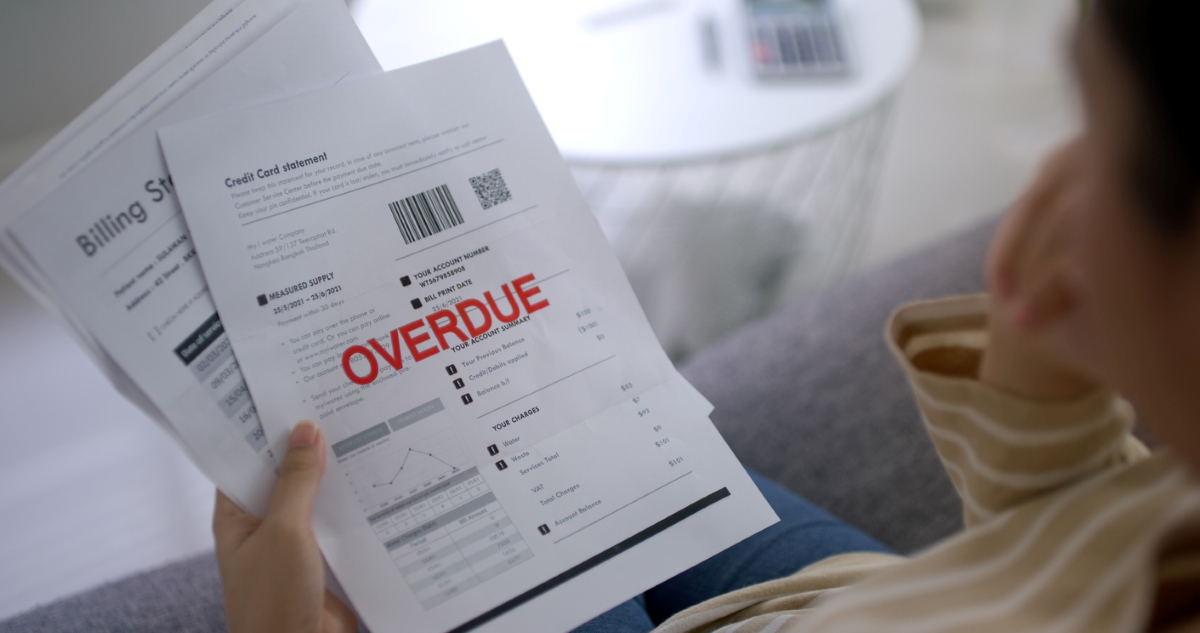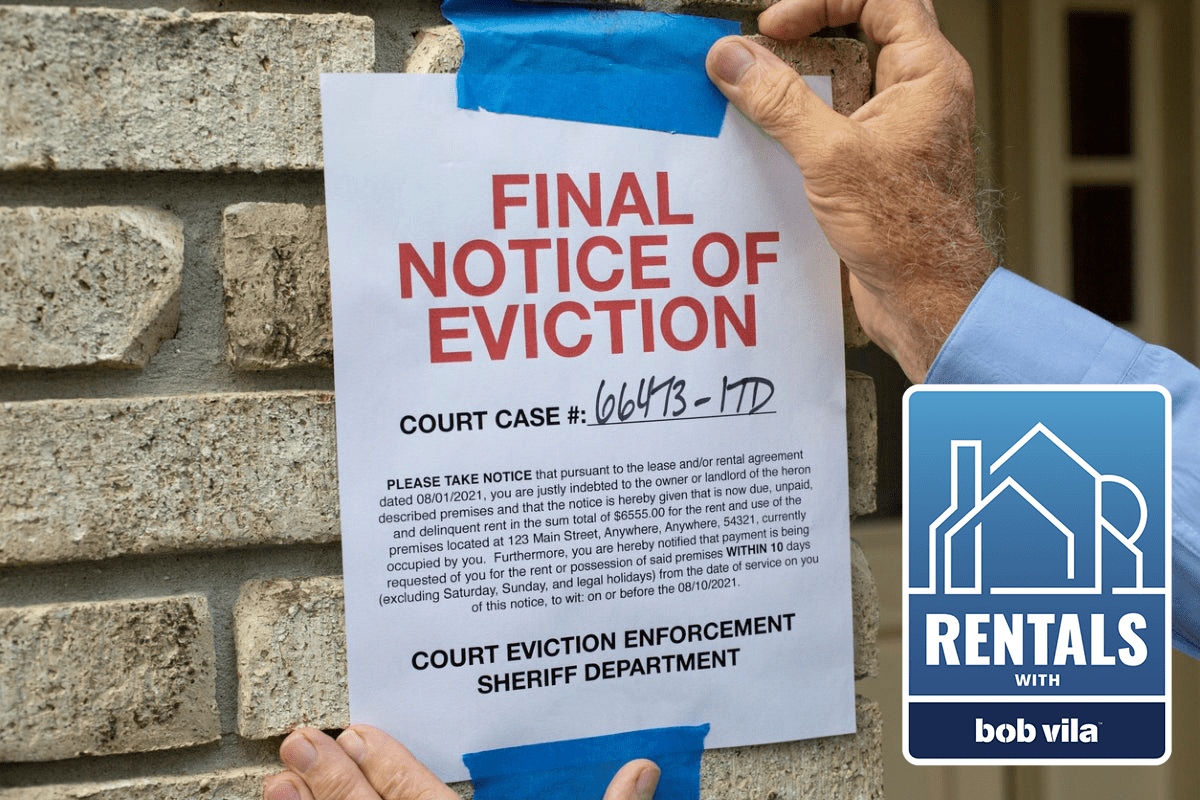We may earn revenue from the products available on this page and participate in affiliate programs. Learn More ›
Welcome to The State of Rentals with Bob Vila, a series dedicated to showing both landlords and tenants the crucial steps in finding the right property, potential challenges with renting, precautions to protect your interests, and ideas for making the most of your next move. We’ve included current market trends mixed with Bob’s tried-and-true advice, our vetted shopping guides, and the behind-the-scenes tips you need to make your rental a home.
While the problems landlords run into with tenants usually are minor, every so often a landlord might need to evict one of their renters. Tenants could find themselves in financial straits and unable to pay rent. Some landlords might be unlucky enough to rent property to a “professional tenant” who knows how to game the system to live rent-free. Others might flout the lease agreement by ignoring no-pet policies. In rare cases, a landlord might discover that a tenant is using their home as a base for illegal activity. While you can fix some problems with warnings and reasoning, sometimes eviction is inevitable.
Reasons for Evicting Tenants

Careful screening of tenants before signing a lease can prevent some evictions. But even with care and mostly good tenants, a landlord will face the occasional problem tenant. If so, there are legal reasons to evict.
1. They’re not paying rent
One of the most common reasons landlords want to evict a tenant is failure to pay the rent agreed upon in the lease. Though tenants might be facing unexpected hardships, like the loss of a job, medical debts, and a host of other financial woes, the fact remains that renting a home is a business. A landlord can choose to be flexible and put the tenant on a payment plan to make up for back rent, but if tenants ultimately can’t pay, the landlord’s only option is to move forward with eviction.
2. A tenant is engaging in illegal activity
If a tenant is using a rental property to sell drugs, engage in prostitution, run an illegal gambling operation, or any other illegal activities, landlords certainly have grounds to evict them. What’s more, landlords who fail to evict such a tenant may face legal trouble of their own. Don’t turn a blind eye. If you knowingly allow such activity to go on, you could be held liable for the tenant’s criminal acts.
3. They’re violating the lease
A lease doesn’t just cover how much the lessee must pay each month; it also stipulates whether they can have a pet, how loud they play their music, and how long guests can stay, among other matters. If the renter ignores a landlord’s requests to amend these issues or racks up numerous violations, the landlord may have no choice but to evict them.
RELATED: Landlord Insurance vs. Homeowners Insurance: What’s the Difference, and Which One Do You Need?
4. Tenants are destroying the property
While normal wear and tear is to be expected in a rental home, more severe damage is not acceptable. If a tenant is putting holes in the walls, destroying appliances, or breaking windows, it might be time to consider eviction. Make sure to take a picture of the damage. A landlord will need to show that the destruction the tenant is causing is creating health and safety problems or reducing the value of the home to evict them successfully.
5. Disturbing other tenants
If a particular tenant is making life miserable for the other tenants around them with loud music or other offensive behaviors, a landlord has grounds to evict them. First, you’ll need to give them a chance to amend their bad behavior. If they fail to do so, you can follow through with an eviction.
6. The lease is up
Some tenants simply refuse to move even after their lease is over. Since leases automatically convert to month-to-month terms after the initial lease ends, the landlord will need to first present the tenant with the required notice, which varies from 30 to 60 days, depending on the state.
How to Evict a Problem Tenant

Evicting a tenant can be a lot of work and stress, so landlords may first try to avoid this more drastic but necessary measure. Once it’s inevitable, there are some basic steps to take.
1. Reason with the tenant
Before proceeding with the eviction process, a landlord should do their best to reason with a tenant. It helps to let them know that they could end up with a bad credit report or a black mark on their rental history. This face-to-face meeting isn’t just for the tenant’s benefit. Residential evictions typically cost thousands of dollars in court costs, repair expenses, and lost rent a landlord might never recoup. If you can resolve the issue without involving the courts, you’ll save yourself a lot of money.
2. Present the tenant with a formal notice
Landlords dealing with one of the evictable issues and with proof to back up the legal reason for eviction should then take the step of presenting the tenant with a formal eviction notice. The notice is pretty straightforward. Depending on the tenant’s situation, it could say one of three things. The notice might tell the tenant they need to pay all the rent they owe to vacate the premises.
The notice also could inform them they need to either stop whatever activity they’re doing that violates the lease or vacate the residence. In extreme cases in which the tenant is engaging in illegal activity or destroying the property, the notice might simply tell them they need to leave immediately.
3. File for the eviction
If the date on the formal eviction notice comes and goes and a tenant hasn’t complied with its terms, the landlord will need to file for the eviction. This varies from state to state, but generally you’ll need to file in small claims court. Once the eviction is filed, the sheriff’s department will serve the tenant with a summons that lists the date and location of the court hearing.
4. Prepare for the hearing
A landlord will need to prove to the judge that the tenant is doing (or failing to do) whatever the landlord alleges to warrant their eviction. Gather payment records and bank statements if they’re failing to pay rent, photos if they’re damaging the property, or complaints from neighbors if they’re disturbing the peace. The landlord also should have evidence showing that they made a good faith effort to allow the tenant fix the problem before proceeding with the eviction.
RELATED: Are Home Warranties Actually Worth It?
5. Evict the tenant
If you’ve done your due diligence and are in accordance with your state’s laws, the court will likely side with you as landlord and issue a writ of restitution, which allows the landlord to engage the help of local law enforcement to evict a tenant. Law enforcement officers will visit the property and give the tenants a few minutes to gather their belongings and leave.
6. Collect overdue rent and damages
If the court grants an eviction, they’ll also grant the landlord judgment for any lost rent, damages, and court fees. At that point, you can hire a collections agency to get the money your tenant owes you. The agencies will put a record of the eviction on the tenant’s credit report and attempt to garnish wages if they refuse to pay.


